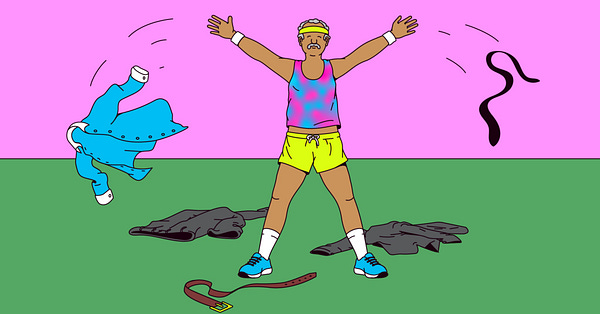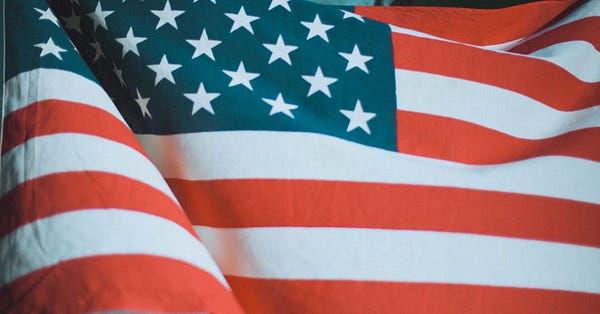Spearmint toothpaste on exoplanets: SHOCK!!




Police Brutality Is Not Always About Race
It’s strange that John McWhorter should be regarded as right-wing. He’s the kind of guy that in the US used to be called a liberal. But he’s a high achieving, black anti-woke warrior.
We largely missed the story that in 2015 in Paradise, Calif., the white officer Patrick Feaster shot the white Andrew Thomas as he was getting out of the S.U.V. he had crashed during a pursuit, even as Thomas’s wife lay gravely injured on the ground at the scene. The parallel with what happened to Nichols is ghastly, as is that between George Floyd’s murder and what happened in 2016 to the white Tony Timpa in Dallas. Although Timpa had requested police officers’ help because he was off his medication, he was killed when they pinned him to the ground as he called out desperately. It was recorded on the officers’ body cams. Members of Timpa’s family have contacted me wondering why the media had so little interest in what happened to him; meanwhile, last year, the officer who had pinned him was promoted.
A common response here is to note that nevertheless, police officers kill unarmed Black people at more than three times the rate they kill unarmed white people, and that this disproportionate rate of Black killings demonstrates that racism affects whether cops kill. But this assumption seems oversimplified. One reason is that poverty also helps determine whether, and in what way, with what results, one encounters the cops. …
And in a striking parallel, unarmed Black people are not only more than three times as likely to be killed by a cop but also more than twice as likely to be poor. In 2021, the poverty rate for white Americans was 8.1 percent, while for Black Americans it was 19.5 percent.
We could propose that the match between these statistics bears no relevance to the issue of police violence and racism and dismiss them as a coincidence. But this would be willfully resistant to examining the significance of patterns in a way that no one would even venture in drawing parallels between, for example, poverty rates and obesity.
Police killings of unarmed or unthreatening American citizens are a national disgrace, and one that requires action. But action requires comprehension, and the simplest explanation — “racist white cops kill Black people” — is clearly often not the correct one.
Good thread

Wasting $100 billion: A powerful reason to vote against Dan
Read the whole thread

What you get for voting against Dan


Competition is good for some things: and not for others
Good, simple piece from Branko.
Great contrarian piece by Simon Kuper


I used to take the standard Anglo-Saxon view that the French should get with reality. French 62-year-olds can now expect to live to 85, creating what’s close to the longest average retirement in global history. Work until 65, and you’ll still have 20 years for boules, I always thought. But my life here has been a series of realisations that on the biggest issues — the Iraq war, nuclear power, cheese — the French tend to be right. I’ve changed my mind about pensions. The French have led the world in creating a glorious new lifestage: the first golden decade of retirement. Their system remains just about affordable. Everyone else ought to learn from them.
The Valhalla for French pensioners is a recent invention. In 1970, Simone de Beauvoir wrote that society treated the old person as a “piece of rubbish” with “miserable” living standards. But in 1981, François Mitterrand became president touting a new vision of retirement: “Live at last!” He cut the retirement age from 65 to 60. Even today, many French workers quit before they reach 60.
French retirement divides into two distinct phases. Phase two is brutal: decay, widowhood, the old-age home and finally, well, the end. But the French ideal is the golden decade or so of freedom that comes before. In your sixties, your work is done, the kids raised, the parents usually dead, and for the only time in your life, you can do whatever you like.
French pensioners enjoy higher median living standards than working people, if you take into account the fact that retirees typically aren’t funding children or mortgages. … Men often reinvent themselves as volunteers, and women as grandmothers.
Much of French adult life is structured in the service of the golden decade. Many people start dreaming of retirement in their twenties. Only 21 per cent of the French say work has a “very important” place in their lives, down from 60 per cent in 1990.
In France, private pensions are rare, and retirement is meant to equalise. I understand Macron’s arguments for reform. But the current generosity is only modestly unsustainable. … The exhorters are the longest-lived, highest-earning people in France. Unlike most employees, they get status and pleasure from their jobs. Here’s my draft proposal for French pension reform: make the top 10 per cent of earners work until, say, 67. Since they are the highest taxpayers, that should help replenish the system. Let ordinary people have fun while they still can.
What makes good comedy
And YouTube being YouTube, it served up another video, which was good too
And my favourite 15 seconds of Seinfeld


Why did Marjorie Taylor Greene shout ‘liar’ at Joe?
Follow the money
On September 9, 2009, President Obama gathered a joint session of Congress for a rare, nationally televised speech about health care. The speech, which came at a moment of peril for the Affordable Care Act, is largely forgotten today. But there is a moment in it that has passed into the political lore and meme of the era. Obama had made the case for his plan and turned to trying to rebut the distortions that had snaked into the national conversation. “There are also those who claim that our reform effort will insure illegal immigrants,” he said. “This, too, is false—the reforms I’m proposing would not apply to those who are here illegally.” Sitting in the audience, Congressman Joe Wilson, a South Carolina Republican, couldn’t contain himself. “You lie!” he shouted.
Obama wasn’t lying. The legislative text barred the undocumented from benefits. But it was Wilson’s breach of decorum, not his more banal abuse of the truth, that stunned even his colleagues. “Totally disrespectful,” said Senator John McCain, just months out from losing the election to Obama. Republican leadership leaned on Wilson to apologize, which he kind of, sort of, did. “I let my emotions get the best of me when listening to the President’s remarks regarding the coverage of illegal immigrants in the health care bill,” he said in a statement. But if the Republican Party wasn’t happy with Wilson’s outburst, Republican voters sure were. Within a few weeks, Wilson raised almost $2 million from conservatives thrilled by his comments—and he went, overnight, from House backbencher to GOP celebrity. It wasn’t just that Wilson was raising money; it was that other Republicans were begging him to come help them raise money. “I’ve received hundreds of invitations,” he said. “I’ve had dozens of members of Congress ask me to appear in their districts. (Rep.) Michele Bachmann said, ‘Joe, you’re a hero in Minnesota.’ ”
In becoming a hero to Bachmann’s supporters, Wilson had become a villain to Obama’s. His opponent in the upcoming 2010 election, Rob Miller, also began fund-raising off Wilson’s notoriety. “He should be doing an apology tour,” he said of Wilson, who had embarked on a thank-you tour in the incident’s aftermath. “He should be apologizing to every teacher, every law enforcement official, every man, woman and child in South Carolina for being disrespectful to the president.” Miller nationalized that argument and raised $1.5 million in the weeks after Wilson went viral. “The game has changed,” he said of his haul. “The campaign has changed.”10 Wilson and Miller went on to raise and spend more than twice as much as any other House race in South Carolina that year, much of it from out-of-state donors. (For all that, Wilson won by about the same margin he posted in 2008.)
From Ezra Klein, Why we’re polarised


An Even Deadlier Pandemic Could Soon Be Here
As the world is just beginning to recover from the devastation of Covid-19, it is facing the possibility of a pandemic of a far more deadly pathogen.
Bird flu — known more formally as avian influenza — has long hovered on the horizons of scientists’ fears. This pathogen, especially the H5N1 strain, hasn’t often infected humans, but when it has, 56 percent of those known to have contracted it have died. Its inability to spread easily, if at all, from one person to another has kept it from causing a pandemic.
But things are changing.


Thank goodness J. D. Vance was ready for the balloon
The unravelling of scientistic psych
In my view psychology should not be thought of as a science. I hope I’m not shocking you. I don’t mean that it shouldn’t strain to engage reality rather than something else. I mean that its whole orientation should be about making life better. Herbert Simon used to distinguish between science and design. The way I put it is that science is about the universe that is: design is about the multiverse that might be (and that universe within it that we want to bring about). In this sense physics and chemistry are sciences whereas medicine and engineering are disciplines of design.
Psych should be like that. Anyway, in one way of understanding it, it’s not! And that version of psych has run into the replication crisis. In any event, here’s an interesting article on a very famous psych study that seems to be … well … bogus.
In 1973, psychologist and Stanford University professor David Rosenhan published a journal article that shook the world of psychiatry to its core.
"On Being Sane in Insane Places" was the result of a study in which eight people without mental illness got themselves admitted to psychiatric institutions — Rosenhan wanted to see whether mental health professionals could actually distinguish between psychologically well people and those with mental illnesses. …
Cahalan interviews two of the "pseudopatients" and realizes that their stories don't quite match Rosenhan's claims.
How to use ChatGPT
A good piece from Tyler
If you are talking to a human and he or she doesn’t understand you, you might make your question simpler. That is exactly the wrong tack to take with ChatGPT. You will get a better result by making your question more detailed and complex.
Ask ChatGPT “What is Marxism?” for example, and you will get a passable answer, probably no better than what you would get by using Wikipedia or Google. Instead, make the question more specific: “Which were the important developments in French Marxism in the second half of the 19th century?” ChatGPT will do much better — and it’s also the kind of question it’s hard to use Google and Wikipedia to answer.…
ChatGPT is most likely to go wrong when it is trying too hard to please you. I have found that it creates associations, affiliations, co-authorships and even marriages that do not exist. I was recently using it with the legal scholar Cass Sunstein, a former Bloomberg Opinion columnist, and we asked it whether the two of us had written a book together. The genius of ChatGPT is that it hit upon exactly the book we might have written, given our overlapping areas of research interest — a book on the philosophical foundations of cost-benefit analysis.
The absurdity is that no such co-authored book exists. Perhaps ChatGPT has been trained on bodies of text where most queries of affiliation are answered in the affirmative, and so to fulfill its task of predicting words well, it will make things up. So while it is wonderful for helping with your workflow or generating ideas, ChatGPT is not good as a fact-checker.





















